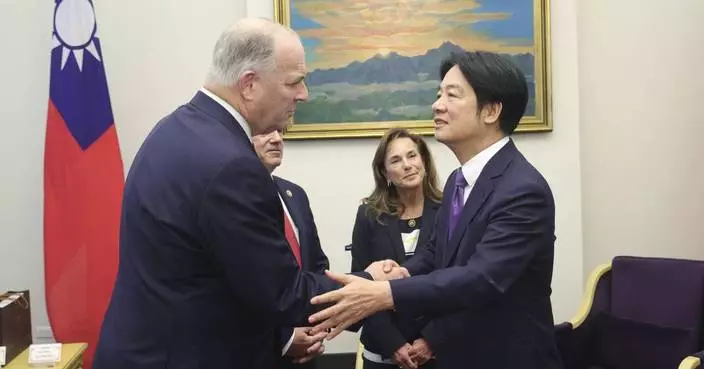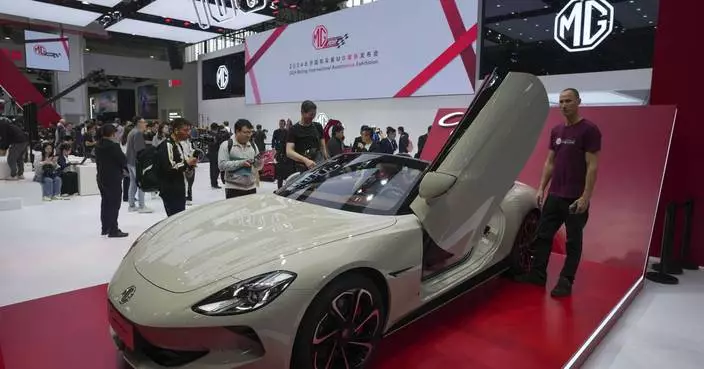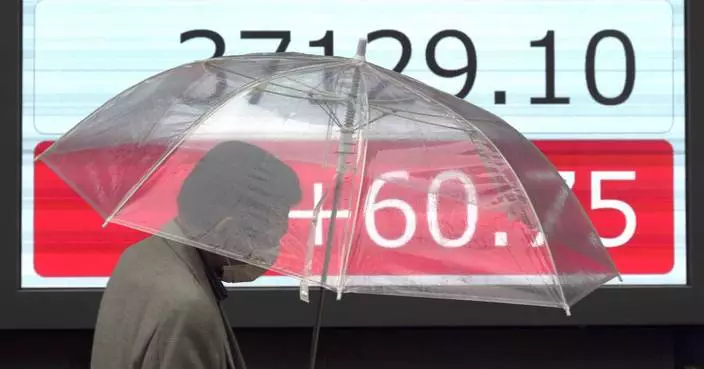World stock markets fell sharply Friday after U.S. President Donald Trump said he was prepared to put new tariffs on all Chinese imports, escalating the rhetoric in a trade war that could hit global economic growth.
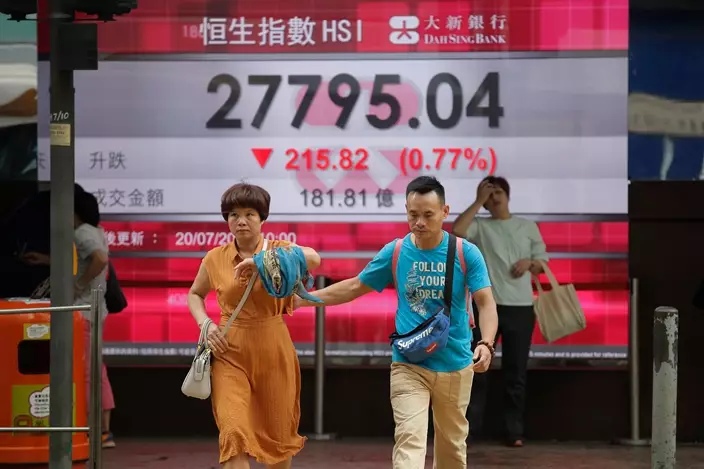
People cross the road in front of an electronic board showing Hong Kong share index outside a bank in Hong Kong, Friday, July 20, 2018. Asian markets wobbled on Friday on signs that China and the U.S. were readying for the imposition of more tariffs on one another. (AP Photo/Kin Cheung)
KEEPING SCORE: From being up slightly earlier in the day, European indexes were trading lower. Germany's DAX fell 0.5 percent to 12,622 while France's CAC 40 dropped 0.7 percent at 5,377. Britain's FTSE 100 fell 0.3 percent to 7,661. U.S. indexes were poised to open lower, with S&P 500 futures down 0.2 percent and Dow futures 0.4 percent lower.
TRUMP TALK: Trump told the TV channel CNBC he was ready to exchange tariffs with China until all of China's exports to the U.S. — worth over $500 billion a year — are hit. "I'm ready to go to 500," he said. Asked if he would do it even at a cost of a stock market drop, he said: "If it does it does."
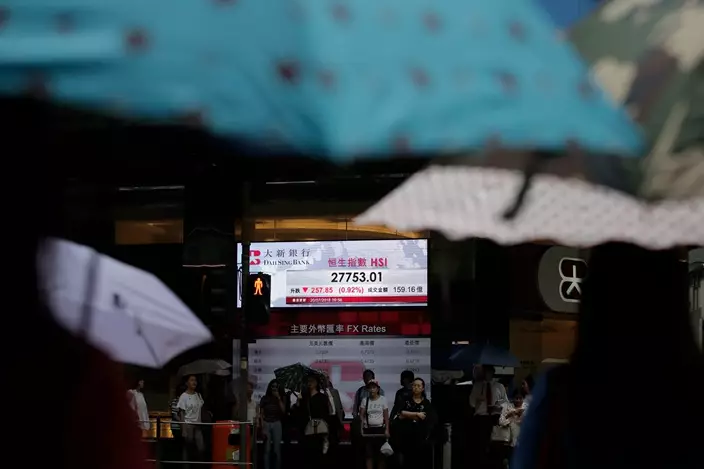
People cross the road in front of an electronic board showing Hong Kong share index outside a bank in Hong Kong, Friday, July 20, 2018. Asian markets wobbled on Friday on signs that China and the U.S. were readying for the imposition of more tariffs on one another. (AP Photo/Kin Cheung)
The comments come as the U.S. government is also considering taxing auto imports. Critics lined up this week to urge the administration to reject the tariffs, arguing they would raise car prices, squeeze automakers by increasing the cost of imported components and invite retaliation from trading partners — and allies — like the European Union and Canada.
ASIA'S DAY: Earlier, before Trump's comments were aired, most Asian markets finished higher. Japan's Nikkei 225 bucked the regional trend, losing 0.3 percent to 22,697.88. South Korea's Kospi added 0.3 percent to 2,289.19. Hong Kong's Hang Seng gained 0.8 percent to 28,224.48. The Shanghai Composite Index rebounded 2.1 percent to 2,829.27. Australia's S&P-ASX 200 increased 0.4 percent to 6,285.90.
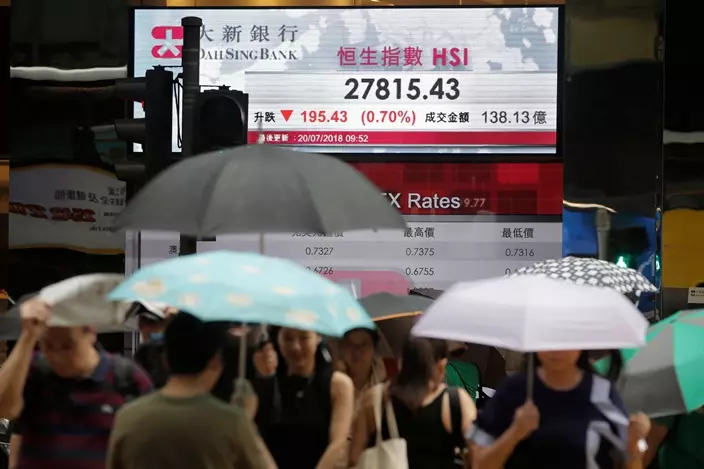
People cross the road in front of an electronic board showing Hong Kong share index outside a bank in Hong Kong, Friday, July 20, 2018. Asian markets wobbled on Friday on signs that China and the U.S. were readying for the imposition of more tariffs on one another. (AP Photo/Kin Cheung)
YUAN DECLINES: The People's Bank of China set the Chinese currency's central parity rate to 0.9 percent weaker against the dollar on Friday. If the yuan continues to depreciate, goods exported to China will become more expensive to consumers there. Chinese exports would also be relatively cheaper, possibly balancing out suggested increases in tariffs by the Trump Administration.
ANALYST'S TAKE: "One theory is that the PBOC is depreciating the yuan because it has not enough ammunition to fight a dollar-for-dollar increase in tariffs. The markets are very risk-off. There is a loss in confidence right now," said Francis Tan, an economist at UOB Bank.
CURRENCIES: The U.S. dollar was trading at 112.45 yen, roughly unchanged from Thursday. The euro rose to $1.1651 from $1.1644.
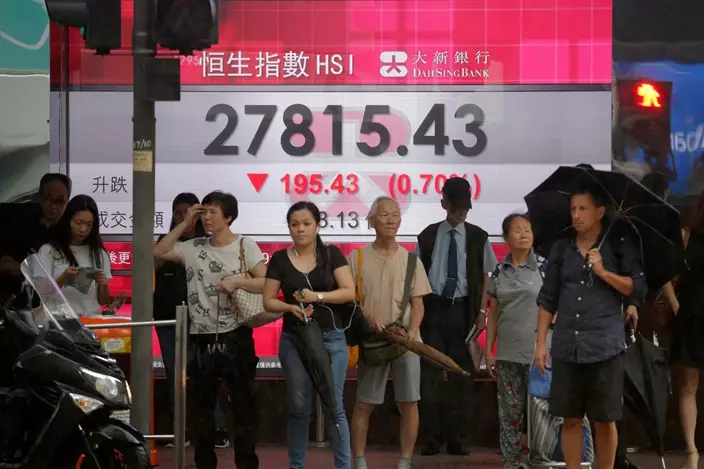
People cross the road in front of an electronic board showing Hong Kong share index outside a bank in Hong Kong, Friday, July 20, 2018. Asian markets wobbled on Friday on signs that China and the U.S. were readying for the imposition of more tariffs on one another. (AP Photo/Kin Cheung)
OIL: Benchmark U.S. crude added 8 cents to $69.54 per barrel in electronic trading on the New York Mercantile Exchange. Brent crude, used to price international oils, gained 6 cents to at $72.64.
SHANGHAI (AP) — U.S. Secretary of State Antony Blinken raised what the U.S. describes as unfair Chinese trade practices during his first full day of meetings in China on Thursday with local government officials in the financial hub of Shanghai.
Blinken met with the city's top official, Communist Party Secretary Chen Jining, and “raised concerns about (Chinese) trade policies and non-market economic practices," the State Department said in a statement.
It said he stressed that the United States seeks healthy economic competition with China and "a level playing field for U.S. workers and firms operating in China.”
“The two sides reaffirmed the importance of ties between the people of the United States and (China), including the expansion of exchanges between students, scholars, and business,” it said.
China's multibillion-dollar trade surplus with the U.S. along with accusations of intellectual property theft and other practices seen as discriminating against U.S. businesses in China have long been a source of friction in relations.
China, for its part, has objected strongly to U.S. accusations of human rights abuses and Washington's support for Taiwan, the self-governing island that Beijing considers its own territory and warns could be annexed by force.
Asked about Blinken's comments, Chinese Foreign Ministry spokesperson Wang Wenbin said China has “always conducted economic and trade cooperation in accordance with market principles, firmly supported the multilateral trading system, and fully complied with the rules of the World Trade Organization.”
“We hope the U.S. will also earnestly respect the principle of fair competition, abide by the WTO rules, and work with China to create favorable conditions for the sound and stable development of China-U.S. economic and trade relations,” Wang told reporters at a daily briefing.
Blinken also spoke with students and business leaders before flying to Beijing for what are expected to be contentious talks with national officials, including Foreign Minister Wang Yi and possibly President Xi Jinping.
Blinken arrived in Shanghai on Wednesday shortly before U.S. President Joe Biden signed a $95 billion foreign aid package that has several elements likely to anger Beijing, including $8 billion to counter China’s growing aggressiveness toward Taiwan and in the South China Sea. It also seeks to force TikTok’s China-based parent company to sell the social media platform.
China has railed against U.S. assistance to Taiwan and immediately condemned the aid as a dangerous provocation. It also strongly opposes efforts to force TikTok’s sale.
Still, the fact that Blinken made the trip — shortly after a conversation between Biden and Xi, a visit to China by Treasury Secretary Janet Yellen and a call between the U.S. and Chinese defense chiefs — is a sign the two sides are at least willing to discuss their differences.
“I think it’s important to underscore the value — in fact, the necessity — of direct engagement, of speaking to each other, laying out our differences, which are real, seeking to work through them,” Blinken told Chen, according to the State Department statement.
“We have an obligation for our people, indeed an obligation to the world, to manage the relationship between our two countries responsibly,” he said. “That is the obligation we have, and one that we take very seriously.”
Chen agreed with that sentiment and said the recent Biden-Xi call had helped the “stable and healthy development of our two countries’ relationship.”
“Whether we choose cooperation or confrontation affects the well-being of both peoples, both countries, and the future of humanity,” he said.
Chen added that he hoped Blinken was able to get a “deep impression and understanding” of Shanghai, a city of skyscrapers, ports and more than 25 million people that is a magnet for commercially ambitious young people from China and abroad.
Most recently, the U.S. has raised concerns that potential overcapacity in Chinese industries — such as electric vehicles, steel and solar panels — might crowd out U.S. and other foreign manufacturers.
Shortly after arriving, Blinken attended a Chinese basketball playoff game between the local Shanghai Sharks and the Zhejiang Golden Bulls, with the home team losing in the last seconds in a 121-120 nailbiter.
With the U.S. presidential race heating up, it’s unclear what ramifications a victory for either Biden or former President Donald Trump might have for relations. But Trump could deepen a trade war he started during his first term. His tough rhetoric on China and isolationist approach to foreign policy could ramp up uncertainties.
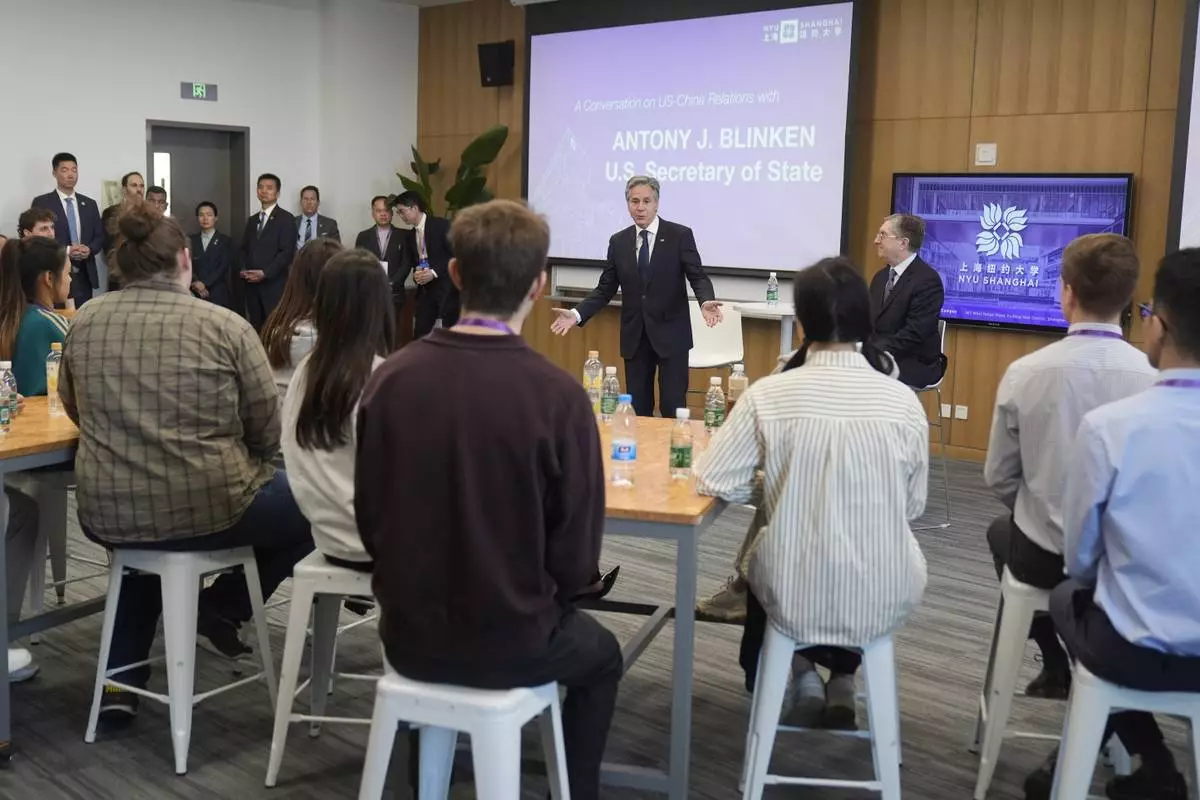
U.S. Secretary of State Antony Blinken, center, with NYU Shanghai Vice Chancellor Jeffrey Lehman, back right, talks to students at NYU Shanghai, Thursday, April 25, 2024, in Shanghai, China. (AP Photo/Mark Schiefelbein, Pool)
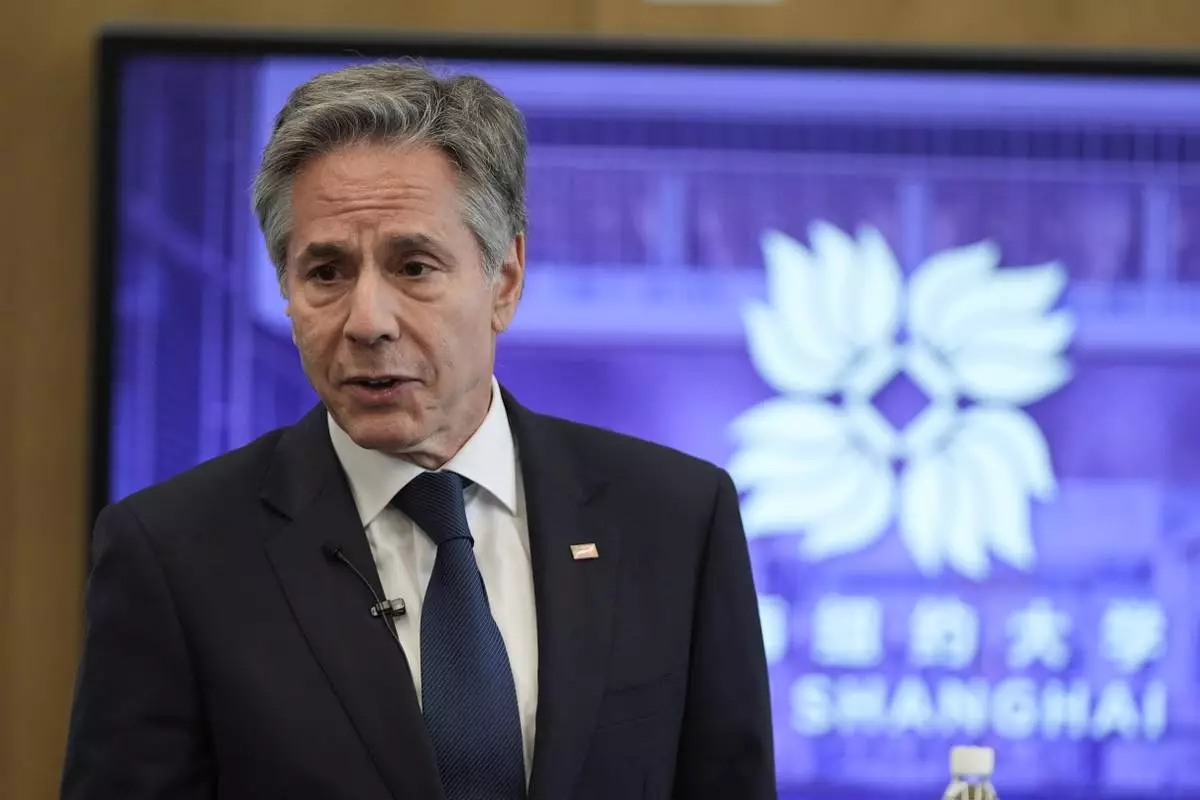
U.S. Secretary of State Antony Blinken talks to students at NYU Shanghai, Thursday, April 25, 2024, in Shanghai, China. (AP Photo/Mark Schiefelbein, Pool)
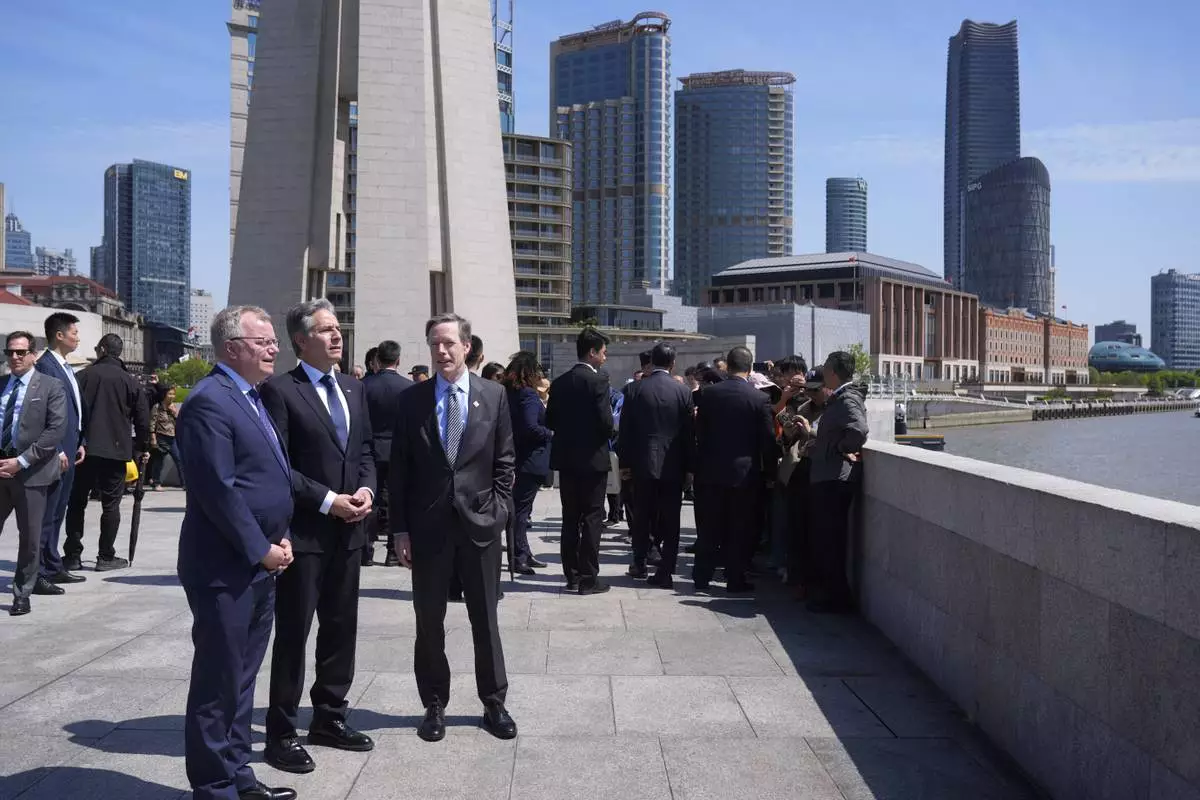
U.S. Secretary of State Antony Blinken, second left, U.S. Ambassador to China Nicholas Burns, third left, and Scott Walker, left, Consul General at the U.S Consulate General in Shanghai, visit a waterfront area called The Bund, Thursday, April 25, 2024, in Shanghai, China. (AP Photo/Mark Schiefelbein, Pool)
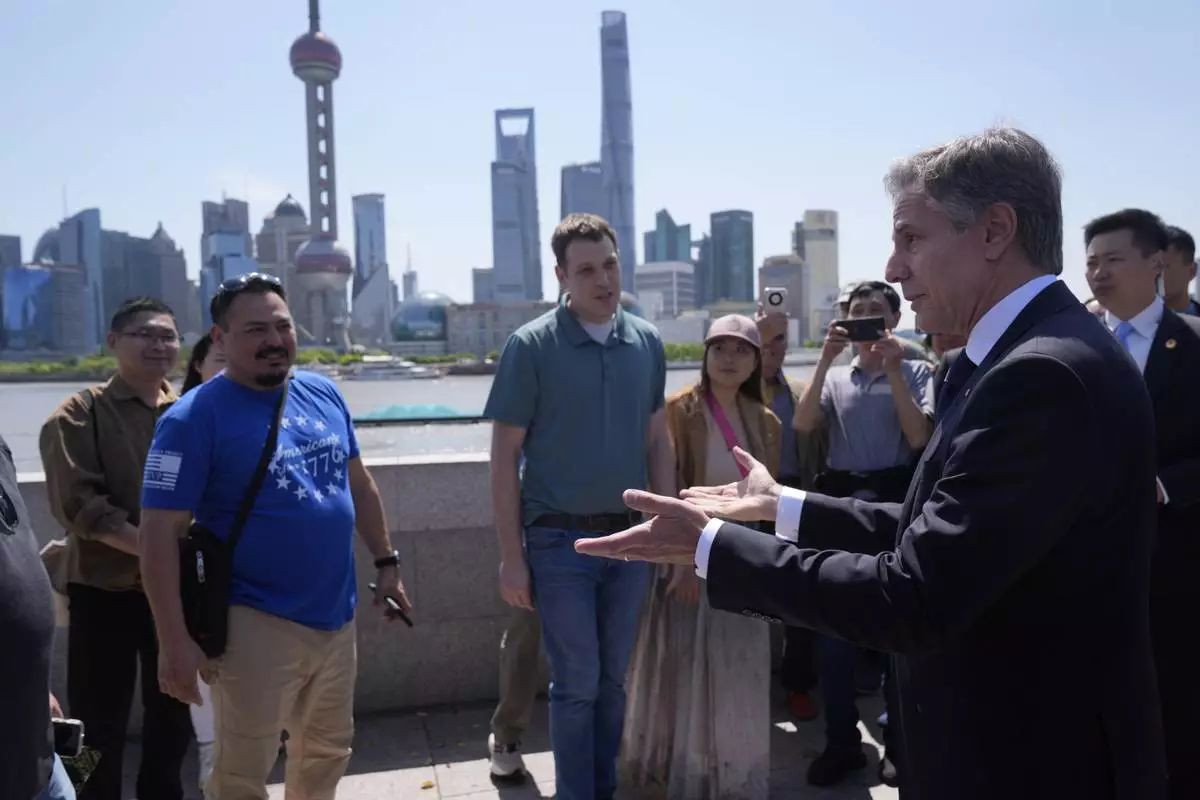
U.S. Secretary of State Antony Blinken, right, talks with U.S. tourists as he walks in a waterfront area called The Bund, Thursday, April 25, 2024, in Shanghai, China. (AP Photo/Mark Schiefelbein, Pool)
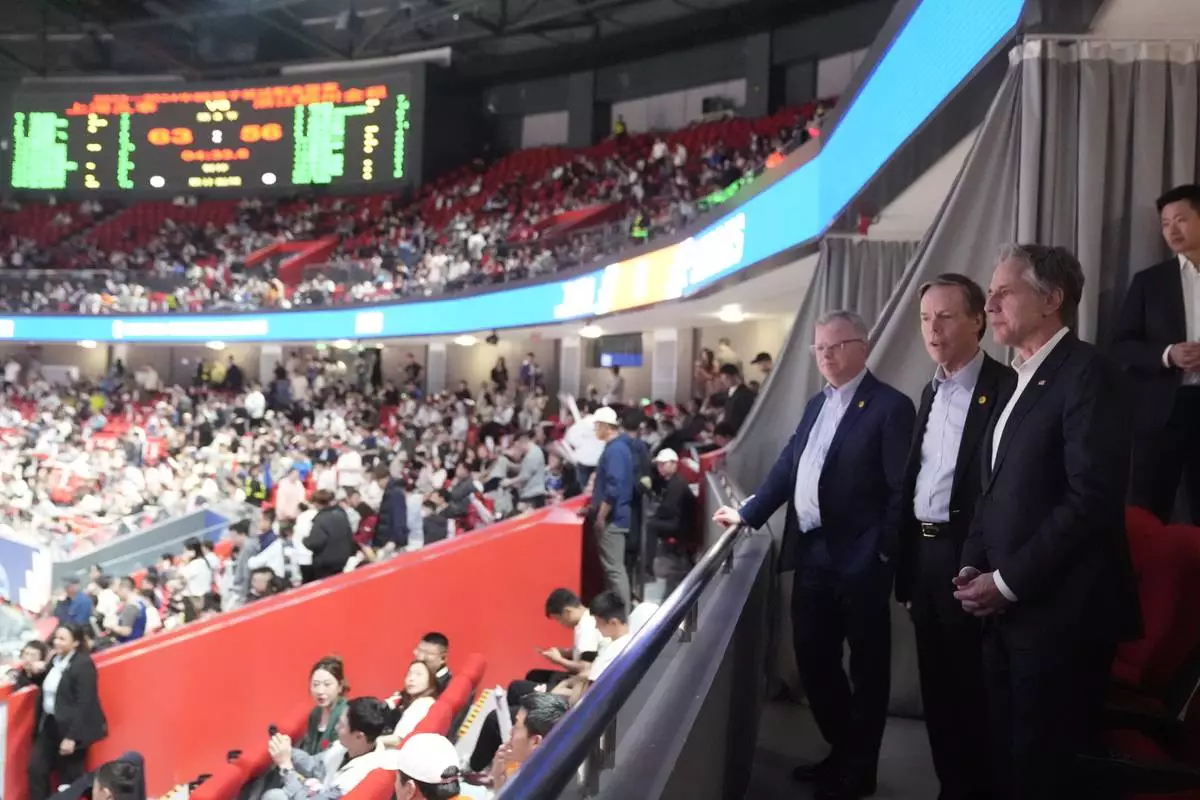
U.S. Secretary of State Antony Blinken talks with U.S. Ambassador to China Nicholas Burns, center, with U.S. Consulate General in Shanghai Scott Walker, left, while attending a basketball game between the Shanghai Sharks and the Zhejiang Golden Bulls at the Shanghai Indoor Stadium, Wednesday, April 24, 2024, in Shanghai, China. (AP Photo/Mark Schiefelbein, Pool)

U.S. Secretary of State Antony Blinken talks with U.S. Ambassador to China Nicholas Burns, center, with U.S. Consulate General in Shanghai Scott Walker, right, while attending a basketball game between the Shanghai Sharks and the Zhejiang Golden Bulls at the Shanghai Indoor Stadium, Wednesday, April 24, 2024, in Shanghai, China. (AP Photo/Mark Schiefelbein, Pool)
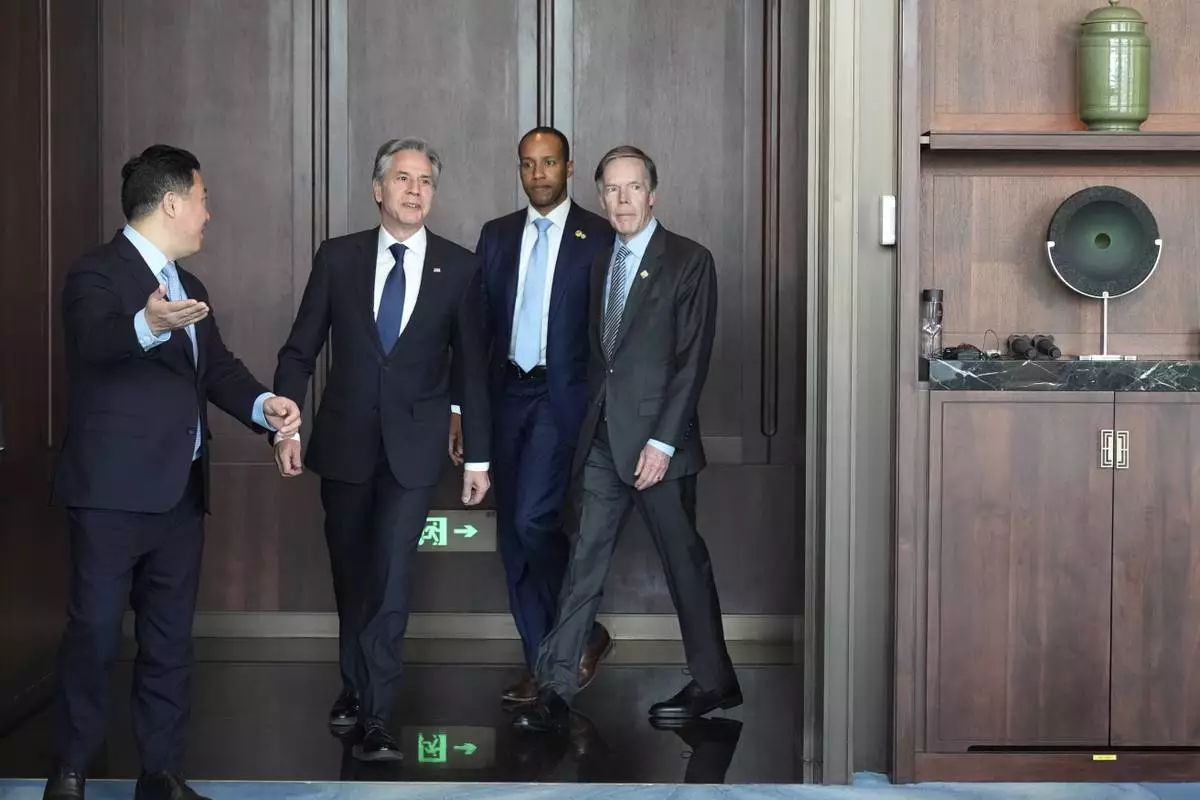
U.S. Secretary of State Antony Blinken, second left, and U.S. Ambassador to China Nicholas Burns, far right, arrive at the Grand Halls to meet with Shanghai Party Secretary Chen Jining on Thursday, April 25, 2024, in Shanghai, China. (AP Photo/Mark Schiefelbein, Pool)
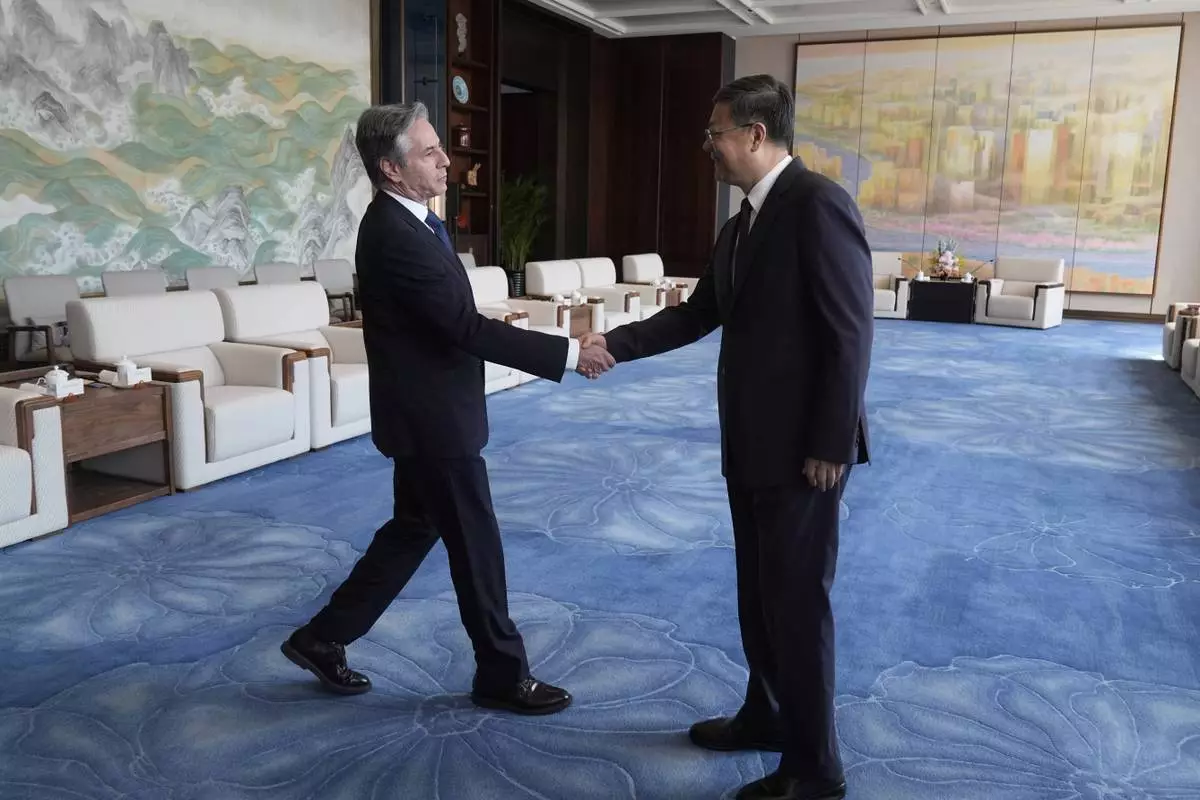
U.S. Secretary of State Antony Blinken, left, shakes hans with Shanghai Party Secretary Chen Jining as they meet at the Grand Halls, Thursday, April 25, 2024, in Shanghai, China. (AP Photo/Mark Schiefelbein, Pool)
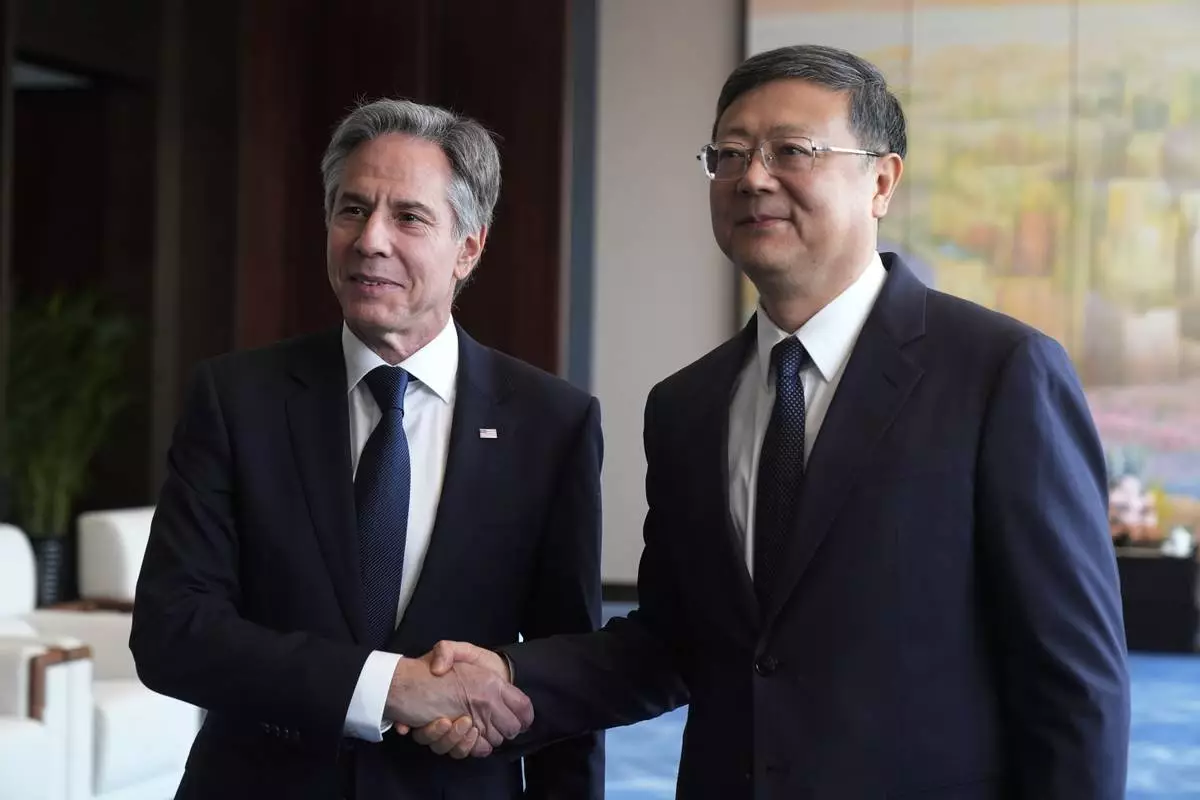
U.S. Secretary of State Antony Blinken, left, meets with Shanghai Party Secretary Chen Jining at the Grand Halls, Thursday, April 25, 2024, in Shanghai, China. (AP Photo/Mark Schiefelbein, Pool)
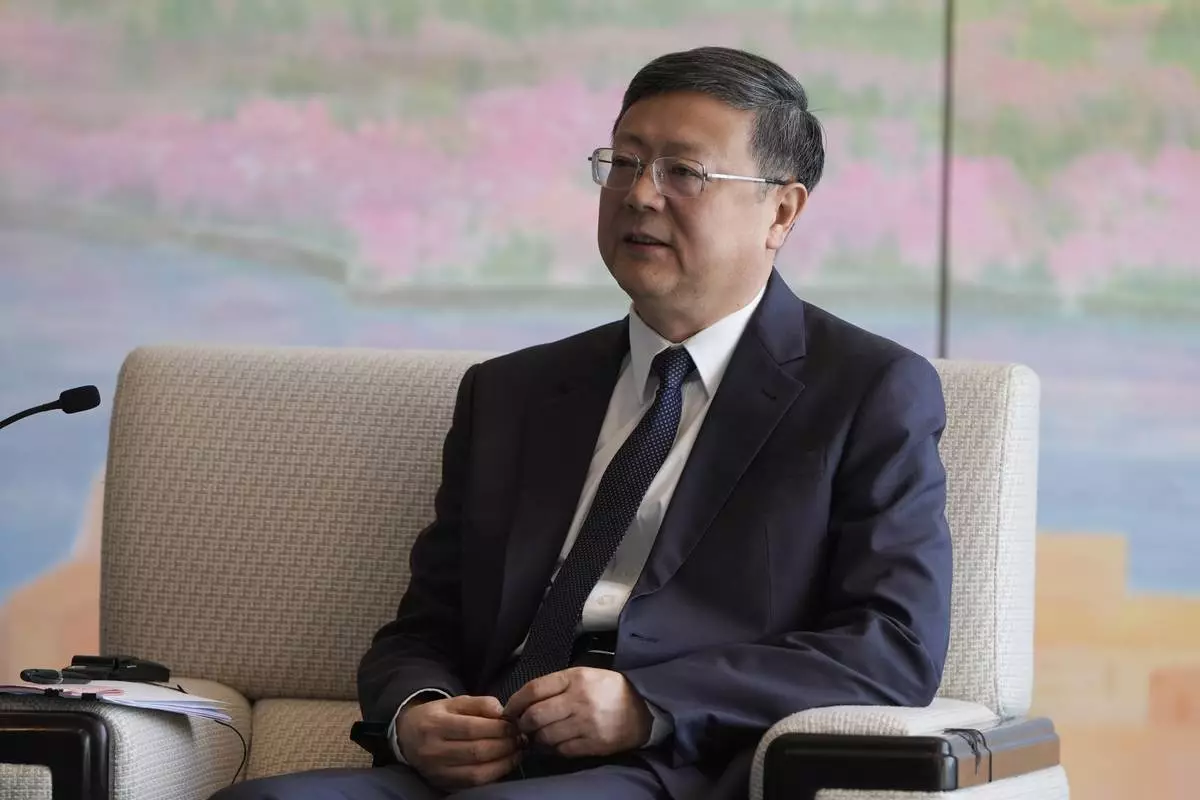
Shanghai Party Secretary Chen Jining talks with U.S. Secretary of State Antony Blinken at the Grand Halls, Thursday, April 25, 2024, in Shanghai, China. (AP Photo/Mark Schiefelbein, Pool)
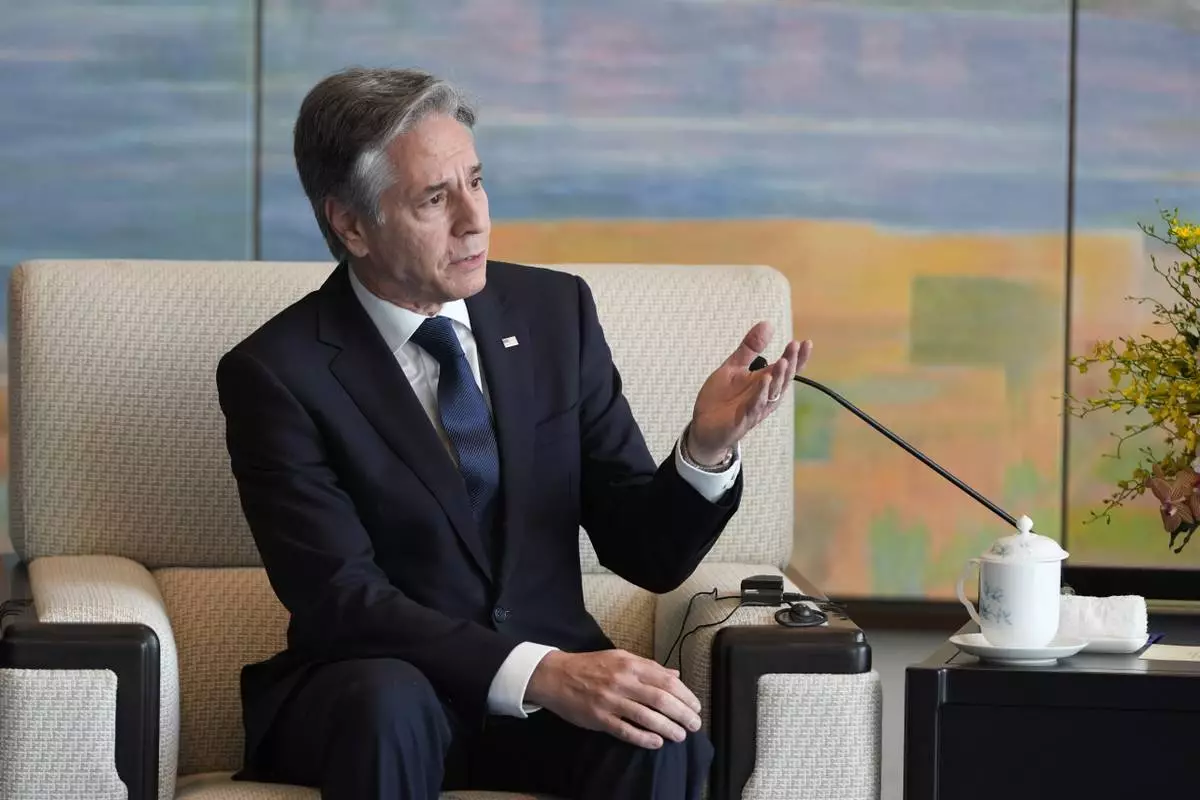
U.S. Secretary of State Antony Blinken talks with Shanghai Party Secretary Chen Jining at the Grand Halls, Thursday, April 25, 2024, in Shanghai, China. (AP Photo/Mark Schiefelbein, Pool)
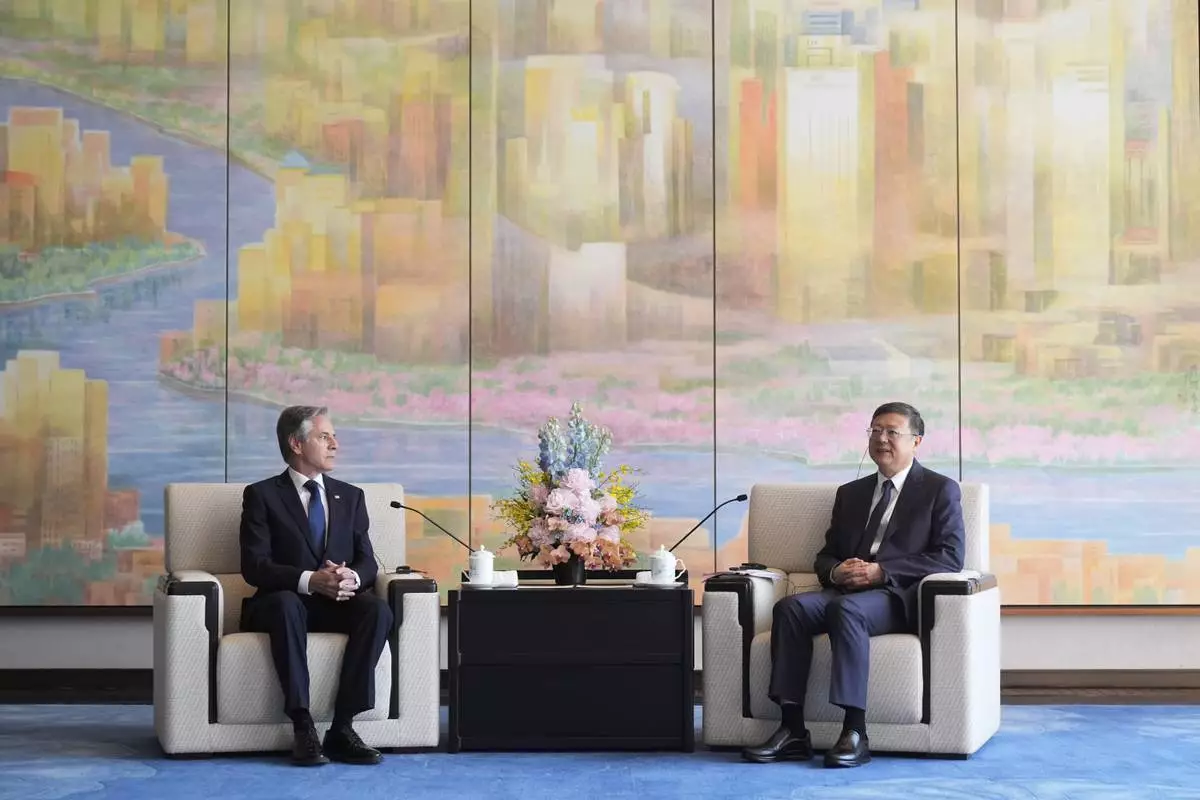
U.S. Secretary of State Antony Blinken, left, talks with Shanghai Party Secretary Chen Jining at the Grand Halls, Thursday, April 25, 2024, in Shanghai, China. (AP Photo/Mark Schiefelbein, Pool)
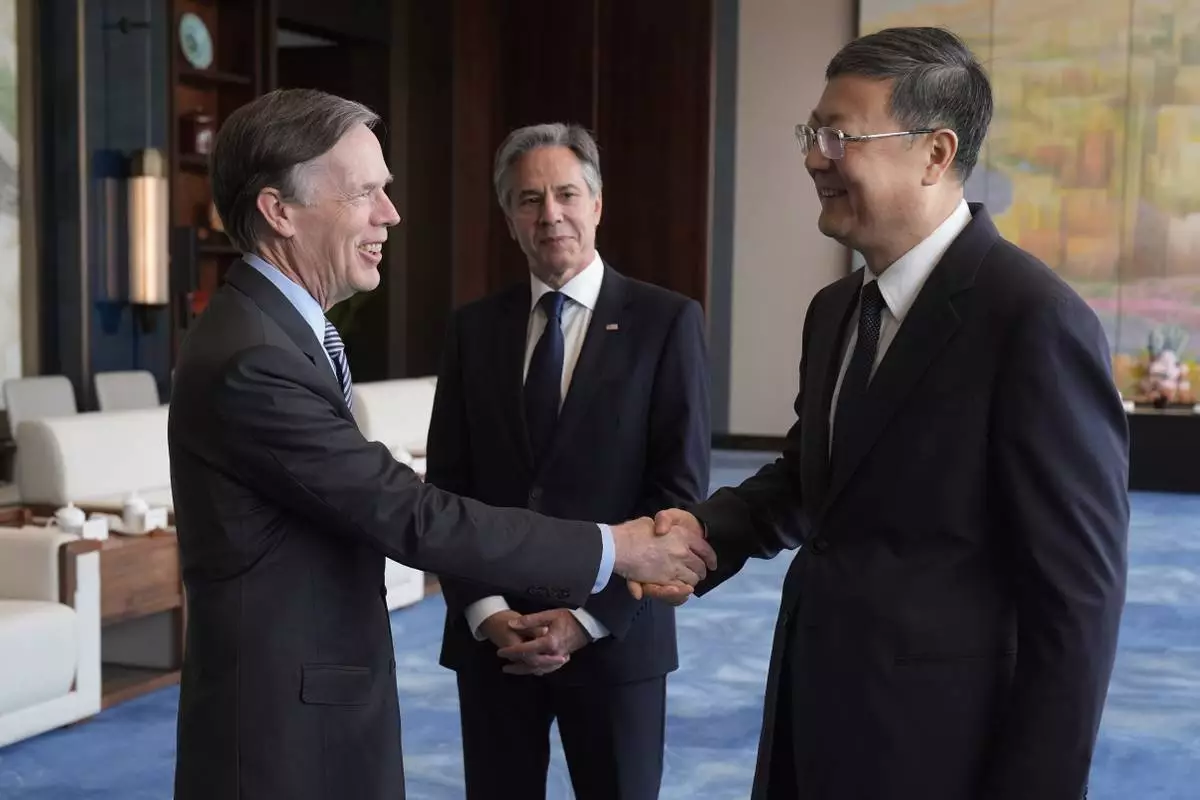
U.S. Secretary of State Antony Blinken, center, watches U.S. Ambassador to China Nicholas Burns, left, shake hands with Shanghai Party Secretary Chen Jining at the Grand Halls, Thursday, April 25, 2024, in Shanghai, China. (AP Photo/Mark Schiefelbein, Pool)




















